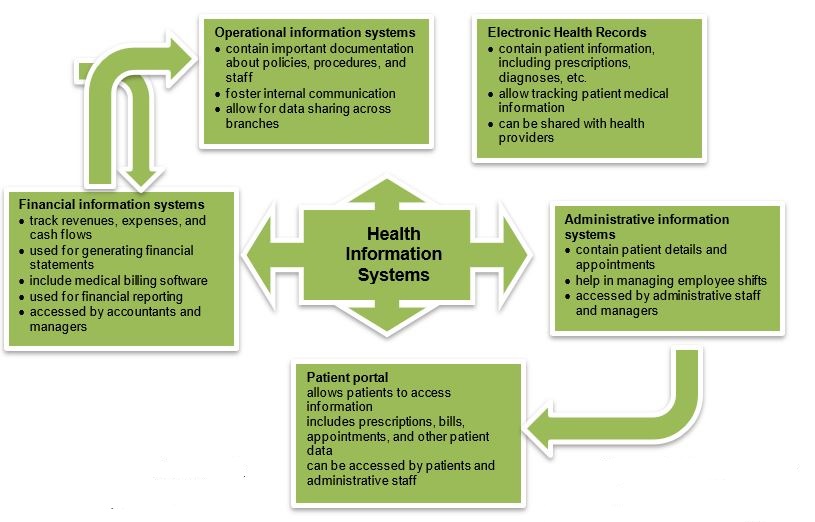Standard Components of Healthcare Information
Today, information systems are at the foundation of many businesses, including health providers. Healthcare information systems help care providers and institutions to manage critical information. However, there are also numerous challenges associated with health information systems that must be addressed by providers. The present paper will describe the main components of healthcare information systems and outline the opportunities and challenges presented by information systems in healthcare.

As seen in Figure 1, there are four standard components of healthcare information systems: operational, financial, administrative, and patient information. Operational information systems assist in the management of health care institutions, as they contain essential documentation, foster internal communication, and allow for data sharing across branches (Wager, Lee, & Glaser, 2017). For instance, corporate e-mails or portals will be part of operational information systems. Financial information systems are used by accountants and managers. They contain the software and documentation required for tracking financial data, such as revenues, expenses, and cash flows (Wager et al., 2017). The software included in financial information systems is also used for financial reporting and billing.
Administrative information systems are used by the administrative staff and managers to track employee shifts, patient appointments, and patient contact information. Lastly, patient information systems include electronic health records and patient portals. Electronic health records enable care providers to monitor diagnoses, prescriptions, and other information about a patient (Joukes, Cornet, de Bruijne, de Keizer, & Abu-Hanna, 2018). Patient portals, on the other hand, allow patients to access their medical information, prescriptions, and provider information, as well as make appointments (Aljabri et al., 2018). Not all institutions have patient portals, although they are now becoming part of standard healthcare information systems.
Benefits
Health care information systems have numerous benefits for companies and care providers. They allow for cost savings and help improve care quality by reducing medical errors (Ngafeeson, 2015). They also improve operations and information management in institutions, which leads to enhanced productivity. However, due to the evolving nature of information technologies and needs, maintaining the adequate standards of healthcare information systems is a significant challenge (Ngafeeson, 2015). For the same reason, there is a significant inconsistency in information systems used in different companies, states, or countries, which prevents adequate information exchange (Ngafeeson, 2015). Finally, technologies that are used today might become obsolete in two or three years, and providers will need to replace them, which leads to additional expenses.
Overall, healthcare information systems can assist in improving the internal operations of medical institutions. They could help to foster communication between patients and care providers and aid managers in fulfilling their administrative function. Nevertheless, healthcare information systems also pose a number of challenges, including additional costs, continuous technological development, and lack of standardization. Future research in healthcare should seek to resolve these problems to allow healthcare institutions to use information systems successfully.
References
Aljabri, D., Dumitrascu, A., Burton, M. C., White, L., Khan, M., Xirasagar, S.,… Naessens, J. (2018). Patient portal adoption and use by hospitalized cancer patients: A retrospective study of its impact on adverse events, utilization, and patient satisfaction. BMC Medical Informatics and Decision Making, 18(1), 70-81.
Joukes, E., Cornet, R., de Bruijne, M. C., de Keizer, N. F., & Abu-Hanna, A. (2018). Development and validation of a model for the adoption of structured and standardised data recording among healthcare professionals. BMC Medical Informatics and Decision Making, 18(1), 54-64.
Ngafeeson, M. N. (2015). Healthcare information systems opportunities and challenges. In M. Khorsow-Pour (Ed.), Encyclopedia of Information Science and Technology (3rd ed., pp. 3387-3395). Hershey, PA: IGI Global.
Wager, K. A., Lee, F. W., & Glaser, J. P. (2017). Health care information systems: A practical approach for health care management (4th ed.). Hoboken, NJ: John Wiley & Sons.